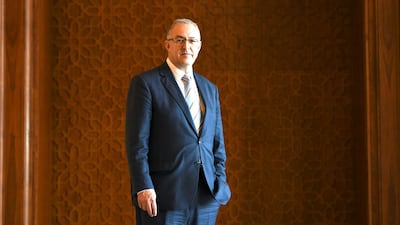Social deprivation and extremism are not always related, says Rotterdam's Muslim mayor Ahmed Aboutaleb.
Mr Aboutaleb, who is of Moroccan descent, was appointed to his position in 2009, and is known for his strong belief in “inclusive society”.
"All arguments that justify how individuals were pushed towards ISIS because of social circumstances are wrong," he told The National during a visit to Abu Dhabi.
The mayor, who came from a humble background, stressed that “poverty does not allow individuals to become killers”.
Religious texts are misunderstood and taken out of context, he said, adding that the Arabic language is so complex that reading one verse from the Quran cannot give a clear understanding of the holy book.
“These guys did it because of their own ideology, they should only have themselves to blame for the decisions they take, not their surroundings,” Mr Aboutaleb said.
This may have not been the case for those who joined ISIS from Morroco and Tunisia, however.
"They were workers who were promised $50 a day, but for the guys that went from Europe, [money] was not the reason," he said.
People in the Netherlands have "a social benefit of a minimum €1,200 a month provided by the government if you don't have a job, so you cannot go to fight for $50 a day."
Mr Aboutaleb stressed that to combat extremism, governments must pay close attention to groups that are using religion as a front to carry out violent attacks.
“We must focus on the group that is arguing they have the legitimacy to kill others by citing any type of religion,” he said.
One must avoid blaming a religion or its followers for terrorism, he added.
“There is an issue among a group of people who call themselves Muslims, I don’t really know them nor do I understand them but they use the vision of Islam to justify killing others,” he said.
Mr Aboutaleb praised the Netherlands for its inclusivity and for attempting to treat its citizens equally.
He gave an example of acceptance when he first came to the country in 1976.
“I had nothing, the country invited me within 24 hours to follow an education for which they paid," he said. "I’m not the only one, the entire immigrant society is invited to follow an education.”
The mayor received a modest education and pulled himself up to the highest circle of society within a decade. He started his career in journalism in the mid-1990s, and then moved to public service before becoming a lobbyist for social diversity.
“I simply cannot understand why people commit such acts instead of being thankful,” he said, referring to the social benefits that Dutch citizens receive.
Rotterdam
Rotterdam is the second-largest city in the Netherlands and Europe's biggest port, and has more than 170 nationalities and cultures from all over the world, its mayor said.
But it can sometimes be a “playground for conflicts”.
“What I try to teach my citizens is that it’s OK to have your own an affiliation with a region or country – please do because you are a human being – but don’t import that conflict to our soil,” he said.
Asked whether the Netherlands would allow citizens who became extremist militants to come back and face trial, Mr Aboutaleb said there was an ongoing debate in the country.
“The international law must prevail in this matter, if they are alive they must face justice,” he said.
The Netherlands experienced an attack on its own soil last week, when a gunman opened fire on a tram in the central Dutch city of Utrecht, killing three people and injuring five.
Turkish-born Gokmen Tanis, 37, was arrested after the attack and is accused of carrying out the shooting with terrorist intent, although his motivation remains uncertain.
He is due to appear before a court in the next two weeks, at which point his detention can be extended by up to 90 days.
Dutch populist party makes gains
Mr Aboutaleb said he was not concerned about gains made by an upstart populist party in Dutch provincial elections last week, which many ascribed as a result of the Utrecht attack.
The Forum for Democracy party opposes immigration and emphasises “Dutch first” cultural and economic themes. Its leader, Thierry Baudet, 36, opposes the euro and thinks the Netherlands should leave the European Union.
“The fact that parties far to the right are gaining is not a threat, it’s part of a democracy," Mr Aboutaleb said. "The funny thing about a democracy is that it’s a cleaning machine, once every four years we clean our homes.”
If an individual is "afraid of democracy” then they should not live in a democratic state, the mayor said.


